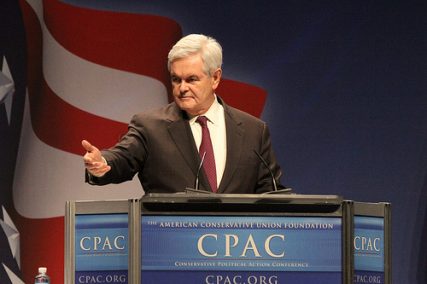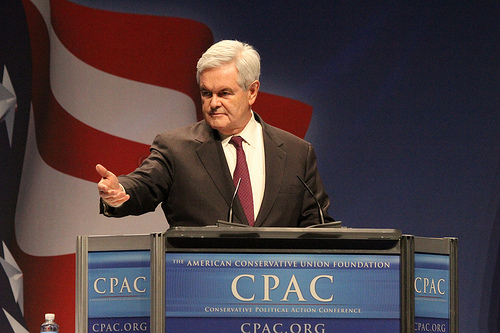This piece was coauthored by Chris Stedman and Tony Lakey.
Yesterday, American Atheists announced plans to sponsor a table at the Conservative Political Action Conference (CPAC), an annual gathering of conservative politicians and activists—the largest and oldest of its kind—hosted by the American Conservative Union.
Hours later, they were uninvited.
While a CPAC representative initially confirmed American Atheists’s participation, they announced just a few hours later that they would no longer allow the organization to table at the event, claiming American Atheists president Dave Silverman “pledged that he will attack the very idea that Christianity is an important element of conservatism.”
It’s unsurprising that some conservatives took issue with how American Atheists addresses religion, considering their controversial billboards and frequent anti-religious rhetoric. (They call themselves the “Marines” of the atheist movement.)
On the other hand, Silverman’s concern that this decision is the result of blowback from the Religious Right certainly isn’t without merit—atheists are marginalized in the U.S., and much of that marginalization seems connected to anti-atheist attitudes among the Religious Right.
But despite being disallowed from having a booth, Silverman (who identifies as conservative) and American Atheists have pledged to attend CPAC anyway, citing a desire to bring politically conservative atheists into their organization.
Dave Muscato, Public Relations Director for American Atheists, offered the following defense of this goal:
There are conservative atheists, too, and they deserve freedom from discrimination because of their atheism just as much as liberal atheists… Although I personally disagree—vehemently—about abortion access and lots of other issues, that is not our purpose as a nonprofit and that is beyond the scope of what we do… About 20% of conservatives are religious nones. That’s a huge number of people and as a politically neutral organization, it’s our responsibility to represent their interests as atheists just as much as liberal atheists.
Fighting for atheists’ right to freedom of expression, regardless of their political affiliation, is important and praiseworthy. But it’s also worth noting that, despite Silverman telling CNN that they are a nonpartisan organization, American Atheists does show support for progressive causes.
Take their frequent public statements in support of LGBTQ (lesbian, gay, bisexual, transgender, and queer) rights. Each time a new state legalizes same-sex marriage, for example, American Atheists congratulates the state from their official Facebook page with an image depicting the state as a rainbow alongside the American Atheists logo. (Here’s a recent example.)

Newt Gingrich speaking at CPAC 2011. Photo by Mark Taylor, courtesy Flickr Creative Commons.
To be fair, American Atheists is not an LGBTQ advocacy organization. They arguably don’t have an obligation to advocate for any group other than atheists. But is it incongruous to advocate for pro-LGBTQ political initiatives while simultaneously claiming to be nonpartisan?
It’s a timely question in light of anti-LGBTQ legislation popping up in states across the U.S. Kansas is considering a bill that would allow businesses to deny service to LGBTQ individuals; Arizona is on the brink of possibly signing one into law. A similar bill was just proposed in Missouri. These initiatives, backed and promoted by conservative politicians, are certainly not in line with the religious freedom that American Atheists seeks to promote.
Of course there are politically conservative atheists, and it makes sense that an atheist organization would seek to engage them. But the question of whether or not their participation in CPAC aligns with their pro-LGBTQ statements remains. Muscato has argued that only atheists can truly support LGBTQ rights—does it make sense for them to claim religion is the source of LGBTQ oppression and simultaneously participate in a program featuring prominent anti-LGBTQ voices?
Regarding their attempted partnership with CPAC, Silverman said, “If Christian influence were wiped from conservatism, conservatism would thrive.” But what about the atheists, LGBTQ and otherwise, who don’t want to see conservative politics thrive?
What do you think? Is there a conflict here, or is American Atheists prompting a valuable discussion? Let us know in the comments.
This piece was coauthored with Tony Lakey. Lakey is a queer atheist and a social justice and interfaith activist. A contributor to Columbia Faith and Values, he studied Philosophy and Sociology at the University of Missouri – Columbia, where he also ran a secular student group. He tweets at @tonylakey. For more information on RNS atheist columnist Chris Stedman, who tweets at @ChrisDStedman, click here.







